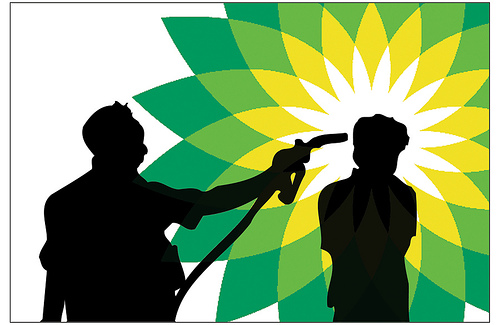Submitted by Lisa Graves on
Who is going to pay to clean up BP's disastrous oil spill, besides BP? After all, they made $14 billion in profit last year alone. BP has asserted it will pay all "legitimate claims" for damages -- talk about a lot of wiggle room there -- but beyond actual cleanup costs, BP's economic damage liability is legislatively, and outrageously, capped at $75 million, a pittance to a company that made 186 times that amount in profit in 2009. Senate Democrats attempted to increase the liability cap to $10 billion by proposing and passing a bill, but their efforts were thwarted by Senate Republicans. The current tally for the cleanup cost stands at $760 million, but that is surely understated.
New Bill Would Quadruple Tax on Oil
 As the oil spill disaster unfolded, President Obama said he expects BP to foot the bill for cleanup, and Democratic Senate Leader Harry Reid assured the American people that "Taxpayers will not pick up the tab." But as the Huffington Post is reporting this week, a new bill in Congress casts serious doubt on these reasonable assurances and expectations. The bill would quadruple the tax on oil produced in the U.S. or imported from foreign countries, to raise federal funds for the cleanup of this and future oil spills, if the responsible party is insolvent (no pun intended). The federal fund, called the "Oil Spill Liability Trust Fund," has $1.5 billion available, and in theory, the U.S. government could also seek reimbursement by the legally "responsible" company. Yes, that's right. It's another instance of privatizing profits but making the public absorb losses.
As the oil spill disaster unfolded, President Obama said he expects BP to foot the bill for cleanup, and Democratic Senate Leader Harry Reid assured the American people that "Taxpayers will not pick up the tab." But as the Huffington Post is reporting this week, a new bill in Congress casts serious doubt on these reasonable assurances and expectations. The bill would quadruple the tax on oil produced in the U.S. or imported from foreign countries, to raise federal funds for the cleanup of this and future oil spills, if the responsible party is insolvent (no pun intended). The federal fund, called the "Oil Spill Liability Trust Fund," has $1.5 billion available, and in theory, the U.S. government could also seek reimbursement by the legally "responsible" company. Yes, that's right. It's another instance of privatizing profits but making the public absorb losses.
Passing on the Cost to Consumers?
The Big Oil companies would surely "pass" the tax onto consumers and so the companies have barely raised a note of public concern about the proposed tax. While clean-up costs can be enormous, the for-profit companies must be required to foot the bill, not consumers. Congress needs to reorganize the federal regulatory powers, which have been captured by Big Oil, which has been allowed far too lax oversight and has obtained ridiculously low caps on damages. Caps on damages are utterly inappropriate and counter-democratic devices that seek to bar juries and judges from imposing a full measure of financial liability to redress harms and damages that have actually been proven. This new tax bill sends the wrong message at the wrong time.


Comments
Anonymous replied on Permalink
Economic damages and the passing on of costs
Anonymous replied on Permalink
It may not be passed on to
orangutan replied on Permalink
As it should be
Lawrence Boxall replied on Permalink
Capping the consequences of runaway competition
Burt in Denver ... replied on Permalink
Corporate liability caps are just Corporate protectionism/welfar
Anonymous replied on Permalink
Liberal POV